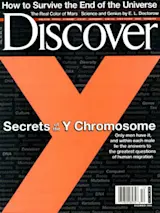* SpaceShipOne, the first private manned spaceship, captures the $10 million Ansari X Prize for carrying passengers 70 miles high twice in one week. A follow-up X Prize Cup now aims to promote annual manned spaceflight competitions.
* Traces of radioactive gas, emitted from magma reservoirs, may indicate when volcanoes like Mount Saint Helens are about to blow, British researchers say.
* The deepest optical view of the universe, created by the Hubble Space Telescope, has uncovered strange formations that researchers suspect may be the earliest-known star-forming galaxies, shining when the universe was just one-twentieth of its current age.
* Russia endorses the Kyoto Protocol to cut carbon dioxide emissions. Participating countries must reduce CO2 output to 5 percent of 1990 levels by 2012. The U.S. and Australia have opted out; developing countries are exempt.
* Illegal ivory trade receives a blow from a new genetic map of elephants across ...














